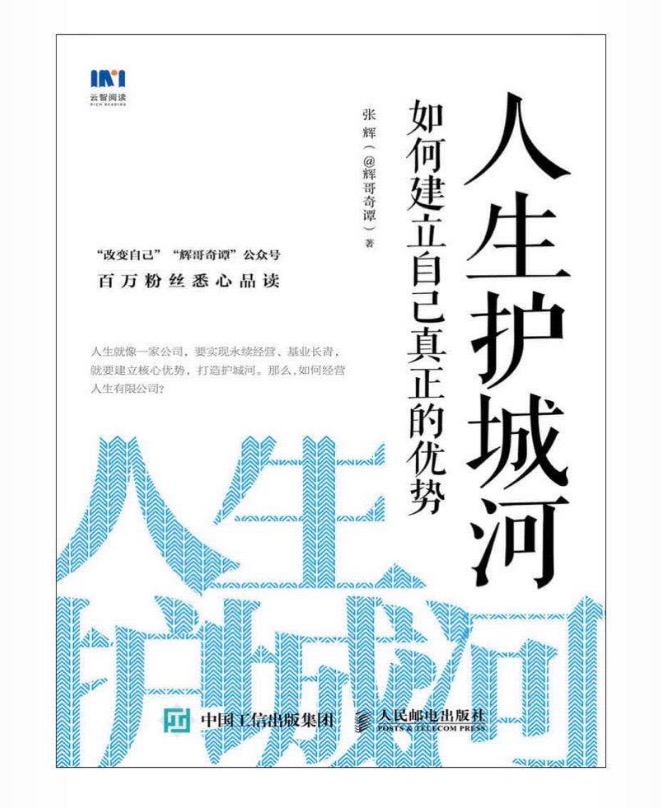- title: “Book Notes: Life’s Moat (《人生护城河》)” tags: [] slug: a5e9171f date: 2020-10-26 21:38:19 summary: “Personal notes after reading 《人生护城河》 — reflections on writing, multiple income streams, and playing to your strengths.”
- Love Writing
- Three Income Streams
- Forget It — Play to Your Strengths
- Final Thoughts
title: “Book Notes: Life’s Moat (《人生护城河》)” tags: [] slug: a5e9171f date: 2020-10-26 21:38:19 summary: “Personal notes after reading 《人生护城河》 — reflections on writing, multiple income streams, and playing to your strengths.”
I decided to take a trip over the weekend. Four long hours in the air and I just couldn’t sleep, so I started reading this book, 人生护城河, and finished it in a few hours. Leaving a trace for myself, I’m jotting down some quick reflections here.

Love Writing
It’s been 6.5 years since I graduated. How many blog posts do I have? 311. That’s not many. Compared with the author, who publishes daily, the gap isn’t just the number of posts; it reflects the thinking and reading behind them.
I agree with his view: love writing, stick with it, and write bravely. I’ve gained a lot from writing in practice:
- 因为苦于没有写作的主题而去思考工作中的技术问题,总结,实践,然后写成博客
- 因为有了博客产出,而降低了给队伍成员或着网友讲解问题的成本
- 因为想更系统准确的讲述技术文章,而去阅读相对多且权威的书籍
- 因为写了几篇优质的博文,从而交到了一些优秀的朋友
- 等等
Writing has many benefits. Since it’s so worthwhile, why not keep at it? I do have the habit, but the frequency is too low — in part because I don’t read enough, solve enough problems, or summarize enough.
So I need to reflect, summarize, and strengthen both the writing and the habits behind it.
His successful practice is a strong proof to me: you must keep writing.
Three Income Streams
Money is unavoidable, but I’ve often managed it passively or muddled through.
I agree with the plan for multiple income sources:
- Salary
- Second income (side projects)
- Investments
对于一般的工薪阶级,确实,单一的收入来源,多元不确定的开支注定了会让个人捉襟见肘。为了解决这个问题,我们必须勇敢,正视这个问题, 并且有意向者正确的方向迈进,从而逐步改善这个情况。不然何时才会不穷,何时才能财务自由呢。
For me, the plan is:
- Grow salary by improving professional skills.
- Build a second income via blogging, Medium, open source, and paid plugins. Thanks to affiliate links on the blog, I’ve made about $20 — not enough to cover VPS costs, but the model is healthy and sustainable. Still, content quantity and quality are the real key.
- As for investing, I started with stocks last year. No losses so far, but no real gains either. The reason is simple: I lack investment knowledge — haven’t even read a single book. So back to the old advice: read more.
Forget It — Play to Your Strengths
This point in the book really hit home. Personally, I love tinkering with software and gadgets, and I love sharing. For a long time I saw these traits as flaws, and my family did too — which made me unhappy. But thinking back, because I tinker, I developed an instinct for user experience that still influences my work. Because I love gadgets, people ask me for help and I’ve deepened and expanded friendships. Because I love sharing, I’ve helped and met many people. I need to admit these traits shaped me. If they take time, why not invest that time?
We often try to learn from others, change ourselves, and fix our weaknesses. But some weaknesses are hard to fix. Why not shift the mindset, amplify and showcase our strengths, and sidestep weaknesses where reasonable?
I often think: our differences come from our strengths, weaknesses, and quirks. If we truly changed them all, wouldn’t we all become the same?
Final Thoughts
I suspect the author, Zhang Hui, has achieved financial freedom — built on excellence, which in turn comes from excellent habits.
So: change yourself, become better, and once you identify the right things, keep doing them. Quantity becomes quality. If you keep doing the right things and keep improving, how bad could life be? Looking back when we’re old, how much regret would there be?

